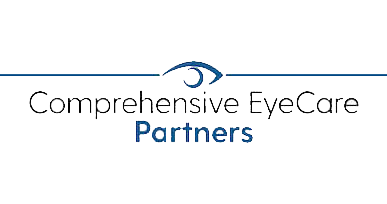Do you have dry, itchy eyes? Many people with dry eye syndrome also have allergies.
As spring becomes a reality, seasonal allergies can make dry eyes harder to deal with. If you wear contact lenses, your symptoms can be even worse.
During the spring months, pollen is the leading cause of allergies. It also triggers a flare-up in your dry eye symptoms.
Antihistamine medications can be a lifesaver if you have allergies, but they can also interfere with your ability to produce tears. If you suffer a further decrease in tear production, this can lead to your dry eye symptoms worsening.
Keep reading to understand the similarities and differences between allergies and dry eyes, how wearing contacts compounds both eye conditions, and how you can treat them this allergy season!
What is Dry Eye Syndrome?
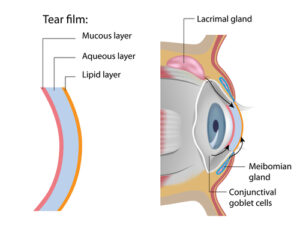
One of the main reasons that people develop dry eye symptoms is they have evaporative dry eye. With evaporative dry eye, the tear film that coats the eye evaporates from the surface of the eye due to there not being enough oil in your tears.
The tear film needs to have three components: oil, water, and mucus for healthy tears. If any of these necessary components are missing, your tears aren’t healthy.
Dry eye syndrome occurs when your eyes don’t make enough tears or the tears you produce are of poor quality. Some common dry eye symptoms are:
- Eye fatigue
- Redness
- Eye pain
- Excessive tearing
- Burning or stinging sensation
- Stringy mucus in and around your eyes
- Increased sensitivity to light
- Foreign body sensation
If you have dry eyes, you may experience some of these symptoms or more of them as the condition worsens over time.
What Are Allergies?
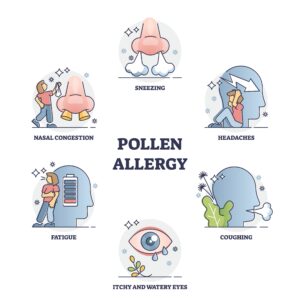
If you have allergies, it’s a biological reaction to an allergen. An allergic reaction is your immune system reacting abnormally to a foreign substance.
Allergies develop when you react to allergens. If you have seasonal allergens, these are common things in the environment like pollen, dust, pet dander, and mold.
Having itchy eyes is one of the main indications of allergies. Other signs of allergies include:
- Swollen eyelids
- Light sensitivity
- Stinging eyes
- Redness
- Watery eyes
- Nasal congestion and a runny nose
Dry Eyes vs. Allergies

The problem with dry eyes and allergy symptoms is that many of their symptoms can overlap, making it more challenging to tell the difference between them. Still, some signs can help determine if you have allergies or dry eye syndrome.
If your eyes feel very itchy and a runny nose or sneezing accompanies it, there’s a good chance you might have seasonal allergies. However, the only way to know whether you have allergies, dry eyes, or both is to visit your ophthalmologist.
Your eye doctor can accurately diagnose the cause of your discomfort and offer proper treatment to help you feel more like yourself.
Contact Lenses, Allergies, and Dry Eyes
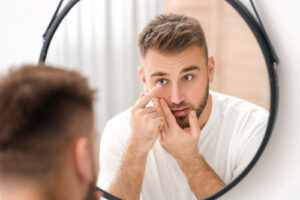
Allergies, contact lenses, and dry eyes are never a good combination. Wearing contacts can worsen your allergies and aggravate your dry eye symptoms.
You can find pollen almost anywhere during allergy season, including in your hair, car, on your pet, house, clothes, and hands. If you wear contact lenses, your risk of transferring pollen from your hands into your eyes increases significantly during allergy season.
Taking them out and putting them in several times a day makes this almost inevitable. You also may need to adjust your contacts throughout the day, increasing this risk even more. If you get pollen in your eyes, it causes irritation, discomfort and makes your eyes even drier than before.
Managing Dry Eyes and Allergies at Home

If you have allergies and dry eyes at the same time, try these tips for more comfortable eyes:
- Wash your hands thoroughly after touching your pet and before inserting or removing your contact lenses.
- Use high-quality artificial tears to lubricate and wash out allergens from your eyes.
- Close windows and use dehumidifiers to reduce pollen and mold in your home.
- Wear sunglasses whenever you go outside to keep pollen out of your eyes.
- Use furnace filters to trap allergens.
- Put air purifiers in the rooms you use the most to clean the air and remove any allergens.
Importance of a Correct Diagnosis
If left untreated, dry eye syndrome is a concerning eye condition that can cause eye infections and long-term damage to your vision. Both dry eyes and allergies can significantly reduce your quality of life.
Because you can have allergies and dry eyes simultaneously, you want an effective treatment plan that prevents your symptoms from intensifying. It should also provide a lasting solution to your pain and discomfort.
After a proper diagnosis, your ophthalmologist will provide a customized treatment plan to keep your eyes happy and healthy, no matter what season it is.
Treating Allergies and Dry Eye Syndrome
If you have allergies, you may want to think about having LASIK. It may not seem obvious how LASIK could help allergies, but it can make a difference.
If you also have dry eye syndrome, your ophthalmologist will treat your dry eyes first, and once they’re under control, you may be able to have LASIK. Having LASIK can eliminate or reduce your need for contacts and break the contact lens and pollen cycle.
Dry eye syndrome is linked to blepharitis and meibomian gland dysfunction (MGD) for many patients. In blepharitis, a biofilm develops on the margin of your eyelids.
BlephEx
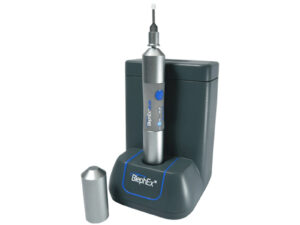
The biofilm promotes the excessive growth of bacteria that clog the meibomian gland and lead to severe dry eye. BlephEx is a highly successful in-office treatment offered at Evergreen Eye Center that removes the biofilm and restores normal gland function, relieving dry eye symptoms.
iLux
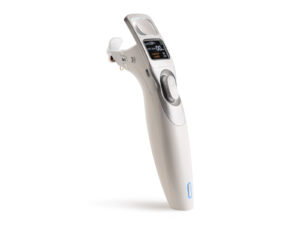
iLux is another leading-edge treatment for dry eye syndrome that addresses the root cause of dry eye: MGD. Meibomian gland dysfunction results in the blockage of the meibomian glands.
If the meibomian glands become blocked, this prevents them from producing enough oil to keep the surface of your eyes from drying out. iLux uses heat while compressing the meibomian glands to clear blockages, enabling the normal production of oils required for a healthy tear film and eye comfort.
Get Help for Your Dry Eyes and Allergies
If you’re struggling with dry eyes and allergies and home remedies aren’t working, our experienced eye doctors at Evergreen Eye Center can help. We’ll provide a highly individualized treatment plan and recommend effective solutions to help you get the relief you need for your allergy and dry eye symptoms.
Are you ready to feel better this allergy season? Schedule an appointment at Evergreen Eye Center to discuss your dry eye treatment options!

